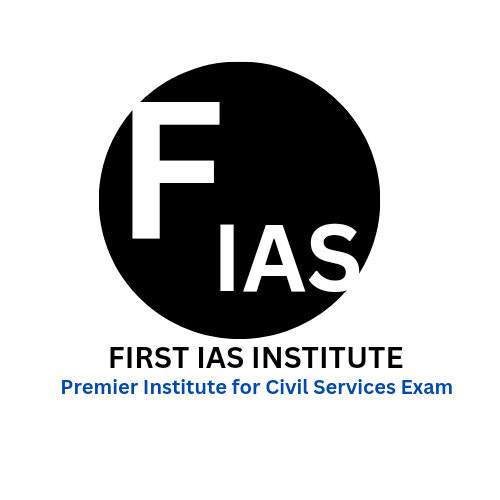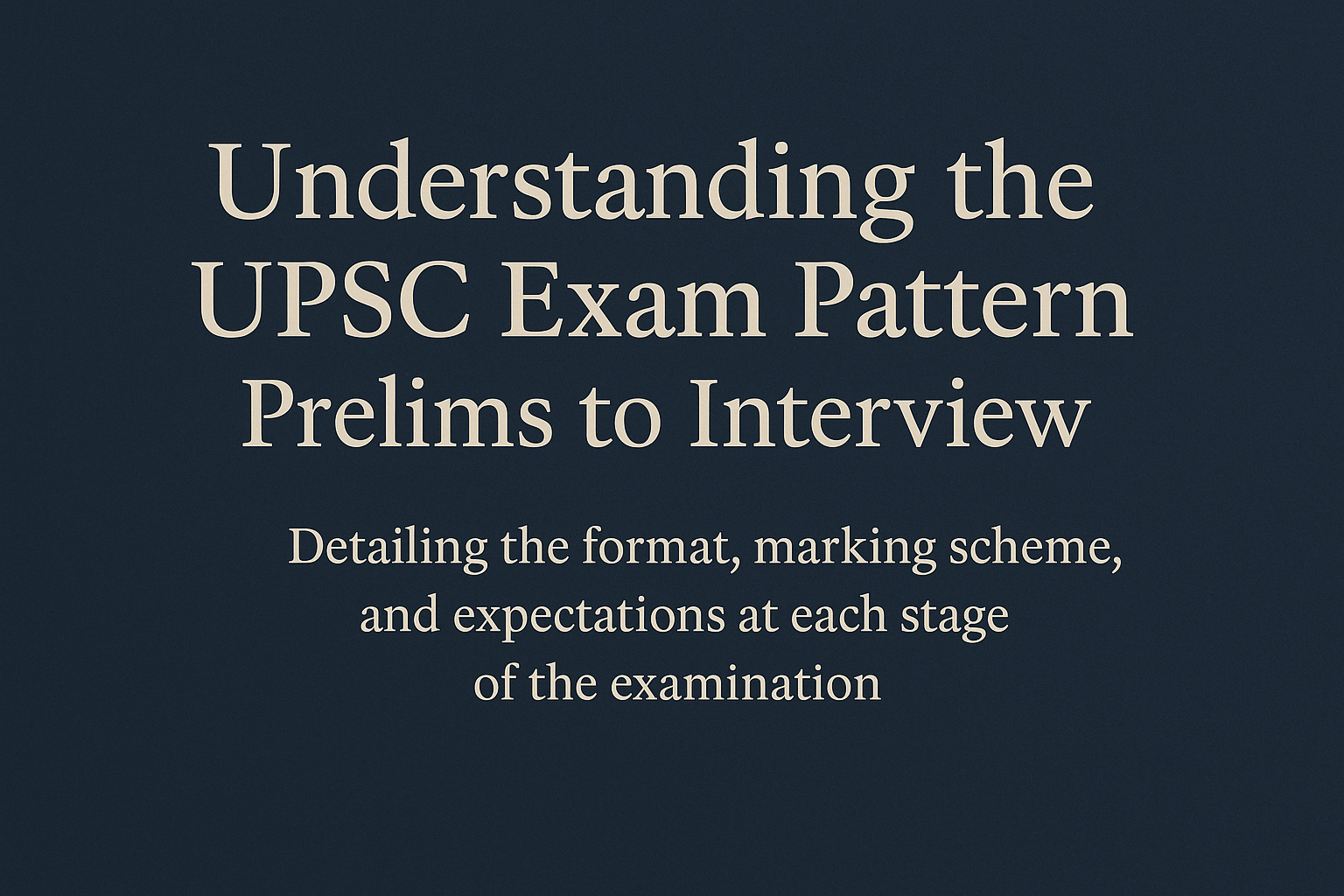Understanding the UPSC Exam Pattern: Prelims to Interview
Cracking the UPSC Civil Services Examination (CSE) is one of the most coveted achievements for aspirants who dream of serving the nation through prestigious services like IAS, IPS, IFS, and others. However, to stand out among lakhs of candidates and reach the final list, a deep understanding of the exam pattern is not just helpful—it's essential.
The UPSC examination is conducted in three distinct stages: the Preliminary Examination (Prelims), the Main Examination (Mains), and the Personality Test (Interview). Each stage evaluates the candidate's ability from a different angle—ranging from knowledge and analytical skills to personality and presence of mind.
Let’s delve deep into the format, marking scheme, and expectations of each of these stages.
Join WhatsApp community for Free Notifications, Updates, Study Material, Mock Tests, Internship Updates, and Current Affairs - CLICK HERE TO JOIN
1. The Preliminary Examination: Screening Test
The UPSC Prelims is the first stage of the Civil Services Examination. It is primarily a screening test meant to eliminate non-serious candidates and shortlist aspirants for the Mains examination. This stage does not contribute to the final merit but holds immense importance, as only candidates who qualify here are allowed to appear for the Mains.
Format
The Preliminary Exam consists of two papers:
Paper I – General Studies (GS):
This paper evaluates the candidate's general awareness on a variety of subjects including history, polity, economy, environment, geography, and current affairs. It consists of multiple-choice questions (MCQs).
Paper II – Civil Services Aptitude Test (CSAT):
This paper assesses the candidate's comprehension skills, logical reasoning, analytical ability, and basic numeracy. Though it's qualifying in nature, one must score a minimum of 33% to have the GS Paper I evaluated.
Marking Scheme
Each paper carries a maximum of 200 marks. Paper I has 100 questions (2 marks each), and Paper II has 80 questions (2.5 marks each). Both papers are of two-hour duration.
There is negative marking in both papers. For every incorrect answer, one-third of the marks assigned to that question are deducted. No marks are deducted for unattempted questions.
Expectations
To clear the Prelims, one must:
- Have a good grasp of static subjects like Indian Polity, History, and Geography.
- Stay updated with current events and developments.
- Practice time management, as accuracy and speed are crucial.
- Be precise, as negative marking penalizes guesswork.
Clearing Prelims requires smart preparation. Since the cut-off varies each year depending on difficulty level and number of candidates, the target should be to consistently score 10–15 marks above the expected cut-off.
To Enroll in FIRST IAS INSTITUTE - Click Here
2. The Main Examination: Descriptive Assessment
The UPSC Mains is the heart of the Civil Services Examination. It tests a candidate’s depth of knowledge, analytical thinking, clarity of expression, and writing ability. Unlike Prelims, this stage is descriptive in nature and carries significant weight in the final merit list.
Format
The Mains examination consists of nine papers, out of which seven are counted for merit and two are qualifying in nature.
- Paper A – Compulsory Indian Language (Qualifying)
- Paper B – English (Qualifying)
- Paper I – Essay
- Paper II – General Studies I (Indian Heritage and Culture, History, Geography of the World and Society)
- Paper III – General Studies II (Governance, Constitution, Polity, Social Justice, and International Relations)
- Paper IV – General Studies III (Technology, Economic Development, Biodiversity, Environment, Security, and Disaster Management)
- Paper V – General Studies IV (Ethics, Integrity, and Aptitude)
- Paper VI – Optional Subject Paper I
- Paper VII – Optional Subject Paper II
Join WhatsApp community for Free Notifications, Updates, Study Material, Mock Tests, Internship Updates, and Current Affairs - CLICK HERE TO JOIN
Marking Scheme
- Each paper (except qualifying papers) carries 250 marks.
- The Essay, General Studies, and Optional Papers contribute a total of 1750 marks.
- The qualifying language papers carry 300 marks each, but their scores are not added to the final tally.
- Candidates must secure at least 25% in the qualifying papers to get the remaining answer sheets evaluated.
Expectations
The Mains is all about structured and relevant content presented in a coherent and well-articulated manner.
- Essay Paper: This paper tests the ability to express ideas clearly and coherently. Candidates are required to write two essays, each carrying 125 marks. The essays must demonstrate clarity of thought, logical flow, and critical analysis.
- General Studies Papers: These papers cover a wide array of topics. UPSC expects analytical depth, balanced viewpoints, integration of current affairs, and the ability to link various concepts. Repetition, superficial content, and vague arguments are penalized.
- Optional Subject Papers: Candidates choose one subject from a list provided by UPSC. This allows them to display expertise and in-depth knowledge in a subject of their choice. Choosing the right optional and mastering it can be a game-changer.
- Ethics Paper: This paper is unique and evaluates a candidate's moral compass. It includes case studies and theoretical questions related to integrity, empathy, and public service values.
Scoring well in the Mains demands strong writing skills, conceptual clarity, and the ability to handle pressure. Regular answer writing practice is non-negotiable, and time management during the actual exam is crucial.
To Enroll in FIRST IAS INSTITUTE - Click Here
3. The Personality Test: Interview Round
The Personality Test, often referred to as the Interview, is the final stage of the UPSC examination. It is conducted by a board comprising experts and senior civil servants. Contrary to popular belief, the interview is not meant to test your knowledge—that has already been assessed in the earlier stages.
Format
The interview is a face-to-face interaction that lasts around 30–40 minutes. It carries 275 marks and is conducted at the UPSC office in New Delhi.
Expectations
The board evaluates several aspects of a candidate’s personality:
- Intellectual and moral integrity
- Clarity of thought and expression
- Awareness of current issues
- Decision-making and leadership qualities
- Balance of judgment
- Ability to remain calm under stress
- Social and cultural sensitivity
Candidates may be asked questions related to their Detailed Application Form (DAF), current affairs, hobbies, or situational judgment. The purpose is to understand how well-rounded and mentally equipped the individual is for a career in civil services.
Unlike the earlier stages, there is no fixed syllabus for the interview. However, thorough preparation, mock interviews, self-awareness, and confidence play a crucial role in performance.
The marks secured in the interview are added to the Mains score, which makes the final merit list out of 2025 marks (1750 from Mains + 275 from Interview).
Join WhatsApp community for Free Notifications, Updates, Study Material, Mock Tests, Internship Updates, and Current Affairs - CLICK HERE TO JOIN
Final Merit and Selection
The final merit list is prepared based on the sum total of marks secured in the Mains (excluding qualifying papers) and the Interview. The total marks come to 2025.
The higher your rank, the better your chances of getting your preferred service and cadre. For instance, to get into the Indian Administrative Service (IAS), a rank under 80–100 (general category) is typically required. Indian Foreign Service (IFS) and Indian Police Service (IPS) also require top ranks.
Each year, the number of vacancies is around 700–1000, while more than 10 lakh candidates apply, and around 4–5 lakh appear for the Prelims. This makes the selection ratio extremely tight and competition intense.
Strategic Insights for Each Stage
- Prelims: Focus on smart revision, mock tests, and current affairs. Avoid excessive reliance on guesswork due to negative marking.
- Mains: Regular answer writing practice, strong GS foundation, command over the optional subject, and essay writing skills are critical.
- Interview: Be authentic, stay informed, and project a calm, confident, and honest personality.
Understanding the nuances of the exam pattern enables aspirants to plan their preparation journey with clarity. Each stage is unique in its own way, and succeeding in all three requires a well-thought-out strategy, discipline, and consistency.
To Enroll in FIRST IAS INSTITUTE - Click Here
Conclusion
The UPSC Civil Services Examination is more than just an academic test—it’s a test of endurance, personality, judgment, and intellectual rigor. Knowing the format and expectations at every stage empowers aspirants to channel their efforts in the right direction and make informed decisions.
Whether you're just starting out or are already deep into your preparation, revisiting the structure of the exam and aligning your approach accordingly can make all the difference.
The journey from Prelims to Interview may be long and challenging, but with the right mindset and preparation, it's certainly conquerable.


 firstiasofficial@gmail.com
firstiasofficial@gmail.com
Leave a Comment